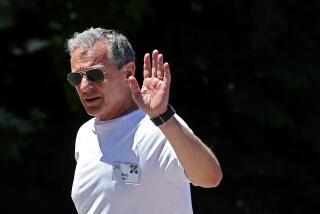Former Treasury Secretary to Help Lead Citigroup
- Share via
NEW YORK — Citigroup Inc. on Tuesday tapped former Treasury Secretary Robert E. Rubin to help run the financial services powerhouse, where he joins Sanford Weill and John Reed in a triumvirate at the top.
Rubin, who quit the U.S. Treasury this summer after a four-year stint as secretary, will become chairman of the board’s executive committee and join a new three-person office of the chairman. Rubin co-headed U.S. investment bank Goldman Sachs Group Inc. before joining the Clinton administration, where he presided over the long-running U.S. economic expansion.
Rubin will have no day-to-day responsibilities at Citigroup, the No. 1 U.S. financial services company. Instead, he expands an already unusual power-sharing arrangement between the group’s chairmen and co-chief executives, Weill and Reed. Rubin, 61, made clear he had no plans to share the chief executive title with the other two.
“I absolutely will not be a CEO,” Rubin said at a New York media conference.
Wall Street applauded Citigroup for reeling in Rubin, renowned along with Federal Reserve Chairman Alan Greenspan for helping to head off a derailing of the U.S. bull market and vibrant economy by last year’s global financial crisis.
“It’s a brilliant move for Citibank because of the wide range of experience that Rubin has had--starting in the private sector at Goldman, Sachs & Co. and adding to that an outstanding record as U.S. Treasury secretary,” said David Jones, chief economist of government bond dealing firm Aubrey G. Lanston & Co.
The former Treasury secretary, who had spent 26 years at Goldman, joins Weill and Reed, whose co-CEO pact has raised questions on Wall Street. Some investors doubted that the two forceful personalities, who orchestrated last year’s merger of leading bank Citicorp and Travelers Group, would be able to lead as equals and steer the company in tandem.
But Citigroup has been racking up record results this year, helped by cost cutting and a rebound in its securities businesses, and is expected to earn close to $10 billion in 1999.
“The role that Bob [Rubin] will help play is that he will be in the information loop with John and I on just about everything that happens . . . he will help us think through the strategy of how we will continue to run this company,” Weill said at the press conference.
Weill and Reed agreed in July to split the tasks of running Citigroup. Because both men are in their 60s, they also have faced questions about who will eventually take the helm.
“The appointment speaks very much to gluing the organization together because Bob Rubin himself is certainly a very talented manager of people, which is important to this company,” said Robert Albertson, who runs investment firm Pilot Financial. “The three-way structure of the office of the chairman commits Citigroup further to healing some of the issues from earlier this year.”
Since the merger, Citigroup encountered hurdles putting Citicorp’s corporate bank together with Travelers’ Salomon Smith Barney’s investment bank in a business that depends on delicate relationships with lucrative corporate clients.
Rubin’s appointment comes days after Congress and the White House struck a historic deal that should remove the final obstacles to an overhaul of Depression-era U.S. banking laws that set up walls between brokers, bankers and insurers. Industry observers saw the formation of Citigroup as a precursor to legislative change because it forged ahead with a de facto breaching of the walls dividing those markets.
Rubin, who had plenty of job offers since he quit the Treasury, received a phone call from Reed and Weill a month ago to discuss the position. He declined to comment on his compensation package.
Citigroup shares closed up 69 cents at $48.50 on the New York Stock Exchange.
More to Read
Inside the business of entertainment
The Wide Shot brings you news, analysis and insights on everything from streaming wars to production — and what it all means for the future.
You may occasionally receive promotional content from the Los Angeles Times.










